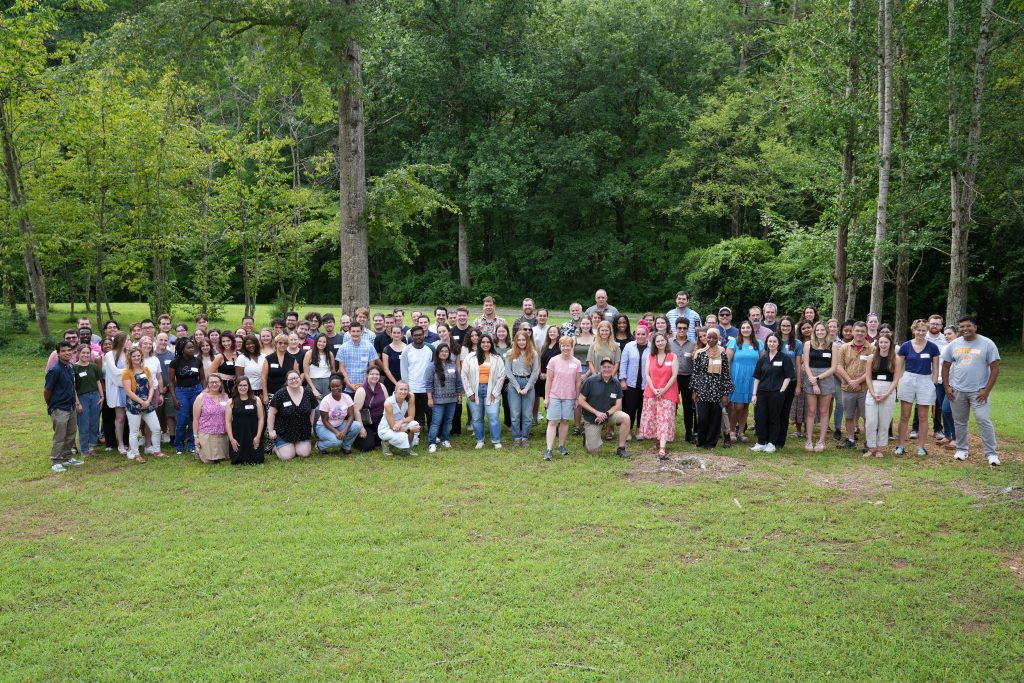Diversity and Climate
The faculty, students, and staff of the University of Tennessee’s Department of Microbiology view diversity, multiculturalism, and social justice as fundamental ethical and societal values that are crucial components of the scientific endeavor and community.
To foster outstanding research, scholarship and practice – and to be people able to work, excel, and lead in an increasingly multicultural and global society with complex challenges and opportunities – we must be inclusive and diverse. We believe that taking action to improve our department’s diversity, equity and inclusivity is the moral and just thing to do. We recognize and value diversity in its myriad forms, including but not limited to: disability status, age, ethnicity, gender, sex, family structure, national origin, race, sexual or romantic orientation, religion and spirituality, political affiliation, socioeconomic background, and veteran status.

Our Department of Microbiology is committed to advancing and maintaining a collegial academic environment based on equity and fairness. Therefore, we work to:
- Create and sustain a welcoming, supportive, and inclusive departmental climate.
- Identify and address institutionally racist and biased practices that impede equity and inclusion.
- Increase the numbers of individuals from under-represented populations by attracting, hiring and retaining more diverse faculty, staff, and administrative professionals.
- Attract, retain, and graduate increasing numbers of students from under-represented populations.
- Advocate for and foster a supportive environment for international populations within student, faculty, staff, and administrative positions.
- Ensure that the teaching and learning experience is inclusive and reflects the Department’s commitment to diversity and social justice.
- Prepare students to become leaders, teachers, researchers, and clinicians in a diverse world.
- Develop and strengthen departmental partnerships with diverse communities on local, state, national, and international levels.
The faculty, students, and staff of the University of Tennessee’s Department of Microbiology view diversity, multiculturalism, and social justice as fundamental ethical and societal values that are crucial components of the scientific endeavor and community. To foster outstanding research, scholarship and practice – and to be people able to work, excel, and lead in an increasingly multicultural and global society with complex challenges and opportunities – we must be inclusive and diverse. We believe that taking action to improve our department’s diversity, equity and inclusivity is the moral and just thing to do. We recognize and value diversity in its myriad forms, including but not limited to: disability status, age, ethnicity, gender, sex, family structure, national origin, race, sexual or romantic orientation, religion and spirituality, political affiliation, socioeconomic background, and veteran status.
Our Department of Microbiology is committed to advancing and maintaining a collegial academic environment based on equity and fairness. Therefore, we work to:
- Create and sustain a welcoming, supportive, and inclusive departmental climate.
- Identify and address institutionally racist and biased practices that impede equity and inclusion.
- Increase the numbers of individuals from under-represented populations by attracting, hiring and retaining more diverse faculty, staff, and administrative professionals.
- Attract, retain, and graduate increasing numbers of students from under-represented populations.
- Advocate for and foster a supportive environment for international populations within student, faculty, staff, and administrative positions.
- Ensure that the teaching and learning experience is inclusive and reflects the Department’s commitment to diversity and social justice.
- Prepare students to become leaders, teachers, researchers, and clinicians in a diverse world.
- Develop and strengthen departmental partnerships with diverse communities on local, state, national, and international levels.
The Microbiology Diversity and Inclusivity Committee is interested in hearing comments, concerns, or general thoughts about the diversity-related climate in our Department. In order to support safe and open expression, we are implementing an a completely anonymous online submission form. This portal is monitored by the Department Head, Dr. Heidi Goodrich-Blair and Department Associate Head, Dr. Alison Buchan, who will direct comments to the appropriate departmental committee.
Learn more about the University of Tennessee’s commitment to Diversity and Inclusivity:
Please know that there are avenues for you to formally report incidents at UT:
- Bias reporting: form
- Harassment / discrimination: https://oed.utk.edu/
- Sexual assault / harassment / stalking: https://titleix.utk.edu/)
The UTK ombudsperson is a confidential resource to discuss issues and reporting options: https://ombuds.utk.edu/
The University of Tennessee offers a range of services for student and employee assistance:
- Distressed Employee Hotline 865-946-CARE (2273)
- Distressed Student Protocol 865-974-HELP (4357)
- Emergency Information Line 865-656-SAFE (7233)
Emergency Contacts for Immediate Help:
- 911
- UT Police Department: 865-974-3111 (emergency)
- Student Counseling Center: 865-974-2196
- Mobile Crisis: 865-539-2409 (available 24 hours)
- Contact Care Line: 865-584-4424
- Suicide Hotline: 800-784-2433
- National Suicide Prevention Lifeline: 800-273-8255